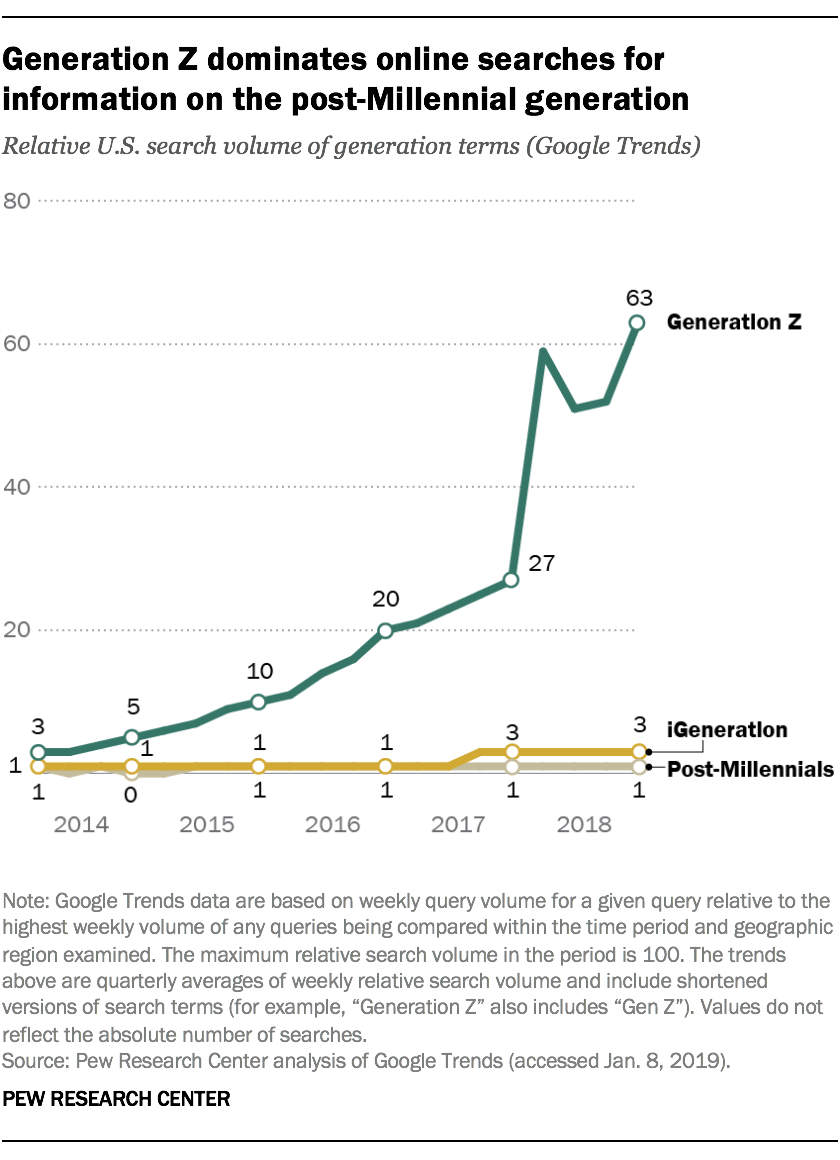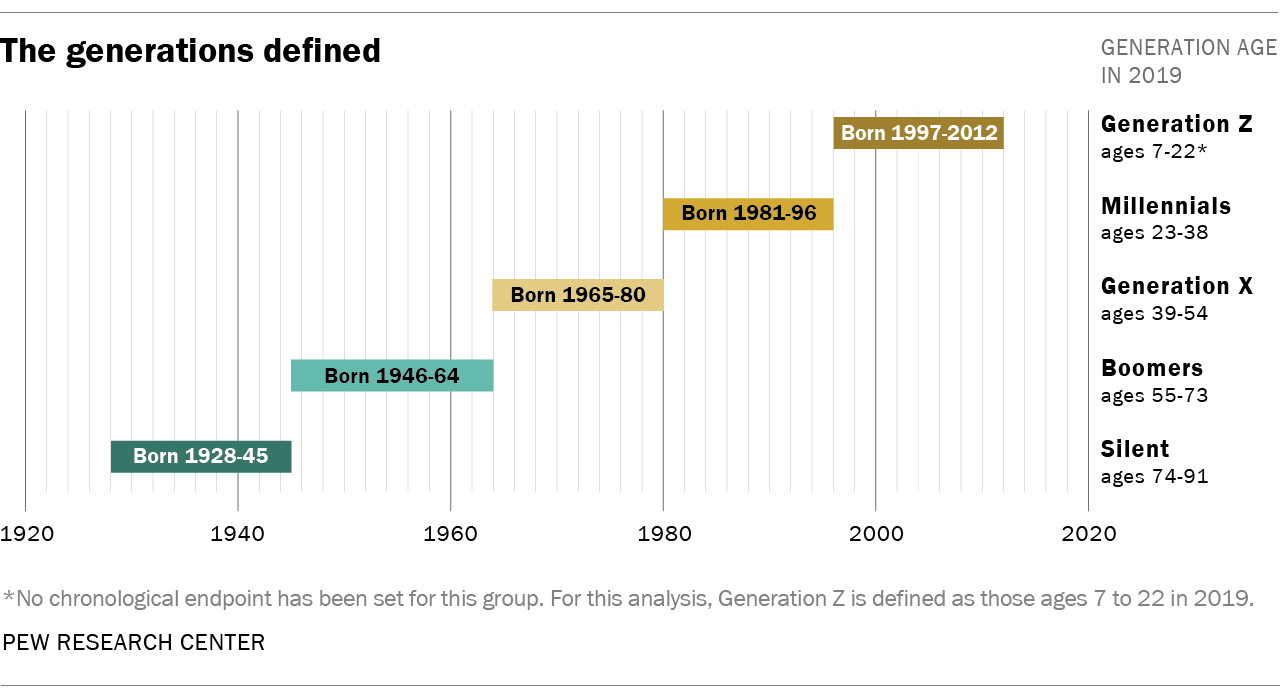What Are the Birth Years for Baby Boomers
For decades, Pew Research Center has been committed to measuring public attitudes on key problems and documenting differences in those attitudes across demographic groups. One lens often employed by researchers at the Heart to understand these differences is that of generation.
Generations provide the opportunity to expect at Americans both past their place in the life cycle – whether a immature adult, a middle-aged parent or a retiree – and by their membership in a cohort of individuals who were born at a like fourth dimension.

As we've examined in by work, generational cohorts give researchers a tool to analyze changes in views over time. They can provide a way to understand how unlike formative experiences (such as globe events and technological, economic and social shifts) interact with the life-cycle and aging process to shape people'due south views of the globe. While younger and older adults may differ in their views at a given moment, generational cohorts let researchers to examine how today's older adults felt about a given effect when they themselves were young, also as to describe how the trajectory of views might differ across generations.
Pew Enquiry Center has been studying the Millennial generation for more than than a decade. But by 2018, it became clear to united states that it was fourth dimension to make up one's mind a cutoff betoken between Millennials and the next generation. Turning 38 this year, the oldest Millennials are well into machismo, and they first entered adulthood before today's youngest adults were born.
In guild to go along the Millennial generation analytically meaningful, and to brainstorm looking at what might be unique about the side by side cohort, Pew Research Eye decided a year ago to use 1996 as the last nascency year for Millennials for our future work. Anyone born between 1981 and 1996 (ages 23 to 38 in 2019) is considered a Millennial, and anyone built-in from 1997 onward is function of a new generation.

Since the oldest among this rise generation are just turning 22 this year, and most are withal in their teens or younger, we hesitated at first to requite them a name – Generation Z, the iGeneration and Homelanders were some early candidates. (In our showtime in-depth look at this generation, nosotros used the term "mail-Millennials" every bit a placeholder.) But over the past year, Gen Z has taken hold in popular culture and journalism. Sources ranging from Merriam-Webster and Oxford to the Urban Dictionary now include this proper name for the generation that follows Millennials, and Google Trends data bear witness that "Generation Z" is far outpacing other names in people'due south searches for data. While there is no scientific procedure for deciding when a proper noun has stuck, the momentum is clearly behind Gen Z.
Generational cutoff points aren't an verbal scientific discipline. They should be viewed primarily as tools, assuasive for the kinds of analyses detailed above. Just their boundaries are non arbitrary. Generations are frequently considered by their span, simply again in that location is no agreed upon formula for how long that span should be. At 16 years (1981 to 1996), our working definition of Millennials is equivalent in historic period span to their preceding generation, Generation Ten (born betwixt 1965 and 1980). By this definition, both are shorter than the span of the Baby Boomers (xix years) – the only generation officially designated by the U.S. Census Agency, based on the famous surge in post-WWII births in 1946 and a significant pass up in birthrates later 1964.
Unlike the Boomers, there are no comparably definitive thresholds past which afterward generational boundaries are defined. But for analytical purposes, nosotros believe 1996 is a meaningful cutoff between Millennials and Gen Z for a number of reasons, including key political, economic and social factors that ascertain the Millennial generation's determinative years.

Most Millennials were between the ages of 5 and xx when the ix/11 terrorist attacks shook the nation, and many were old enough to comprehend the historical significance of that moment, while almost members of Gen Z have little or no retentiveness of the event. Millennials as well grew up in the shadow of the wars in Iraq and Afghanistan, which sharpened broader views of the parties and contributed to the intense political polarization that shapes the current political environs. And nearly Millennials were between 12 and 27 during the 2008 election, where the strength of the youth vote became part of the political conversation and helped elect the offset black president. Added to that is the fact that Millennials are the virtually racially and ethnically diverse developed generation in the nation's history. Nonetheless the adjacent generation – Generation Z – is fifty-fifty more than diverse.
Beyond politics, near Millennials came of age and entered the workforce facing the tiptop of an economic recession. As is well documented, many of Millennials' life choices, future earnings and archway to adulthood accept been shaped past this recession in a way that may non exist the case for their younger counterparts. The long-term effects of this "irksome start" for Millennials will be a factor in American society for decades.
Engineering science, in item the rapid evolution of how people communicate and interact, is another generation-shaping consideration. Baby Boomers grew up every bit television expanded dramatically, changing their lifestyles and connection to the world in cardinal ways. Generation X grew upward as the estimator revolution was taking agree, and Millennials came of historic period during the internet explosion.
In this progression, what is unique for Generation Z is that all of the above accept been office of their lives from the outset. The iPhone launched in 2007, when the oldest Gen Zers were 10. By the time they were in their teens, the primary means by which immature Americans connected with the web was through mobile devices, WiFi and high-bandwidth cellular service. Social media, abiding connectivity and on-demand entertainment and advice are innovations Millennials adapted to equally they came of historic period. For those born after 1996, these are largely assumed.
The implications of growing up in an "always on" technological environs are merely now coming into focus. Recent research has shown dramatic shifts in youth behaviors, attitudes and lifestyles – both positive and concerning – for those who came of historic period in this era. What we don't know is whether these are lasting generational imprints or characteristics of boyhood that will become more muted over the form of their adulthood. Beginning to track this new generation over time volition be of significant importance.
Pew Enquiry Centre is not the first to draw an analytical line betwixt Millennials and the generation to follow them, and many have offered well-reasoned arguments for drawing that line a few years earlier or afterward than where we take. Perhaps, as more data are nerveless over the years, a articulate, singular delineation will sally. We remain open to recalibrating if that occurs. But more than than likely the historical, technological, behavioral and attitudinal information will testify more of a continuum across generations than a threshold. As has been the example in the by, this means that the differences within generations can exist just every bit smashing as the differences across generations, and the youngest and oldest within a ordinarily defined cohort may feel more in common with bordering generations than the one to which they are assigned. This is a reminder that generations themselves are inherently diverse and circuitous groups, non simple caricatures.
In the near term, y'all will see a number of reports and analyses from the Heart that continue to build on our portfolio of generational enquiry. Today, we issued a study looking – for the kickoff time – at how members of Generation Z view some of the key social and political problems facing the nation today and how their views compare with those of older generations. To be sure, the views of this generation are not fully formed and could change considerably as they age and as national and global events intervene. Nonetheless, this early look provides some compelling clues about how Gen Z will aid shape the future political landscape.
In the coming weeks, nosotros will be releasing demographic analyses that compare Millennials to previous generations at the aforementioned stage in their life bike to run across if the demographic, economic and household dynamics of Millennials continue to stand up autonomously from their predecessors. In addition, we will build on our research on teens' engineering science use by exploring the daily lives, aspirations and pressures today's 13- to 17-yr-olds face up as they navigate the teenage years.
Yet, we remain cautious most what can be projected onto a generation when they remain so young. Donald Trump may be the beginning U.S. president most Gen Zers know as they turn 18, and just as the dissimilarity betwixt George Due west. Bush-league and Barack Obama shaped the political debate for Millennials, the current political environs may have a similar effect on the attitudes and date of Gen Z, though how remains a question. As important as today's news may seem, information technology is more than than probable that the technologies, debates and events that will shape Generation Z are nonetheless notwithstanding to be known.
Nosotros wait forward to spending the adjacent few years studying this generation every bit it enters machismo. All the while, we'll keep in mind that generations are a lens through which to empathise societal alter, rather than a characterization with which to oversimplify differences between groups.
Annotation: This is an update of a post that was originally published March 1, 2018, to announce the Center's adoption of 1996 every bit an endpoint to births in the Millennial generation.

Source: https://www.pewresearch.org/fact-tank/2019/01/17/where-millennials-end-and-generation-z-begins/
Post a Comment for "What Are the Birth Years for Baby Boomers"